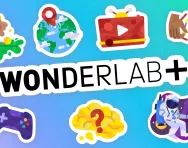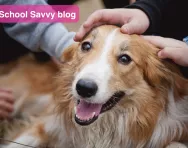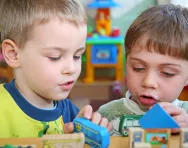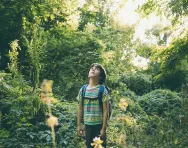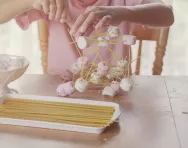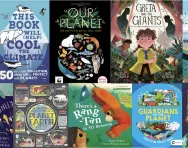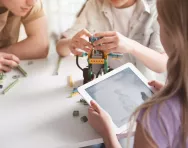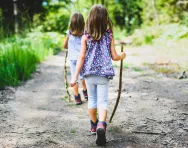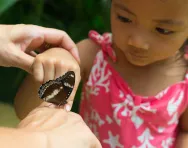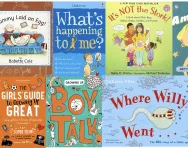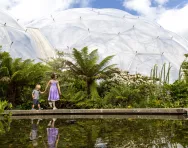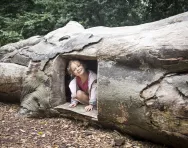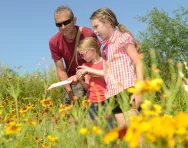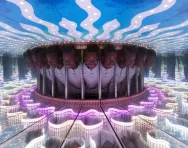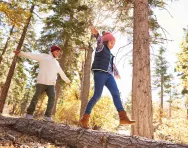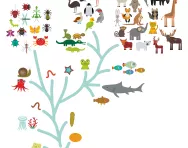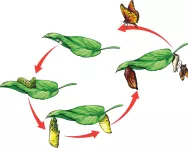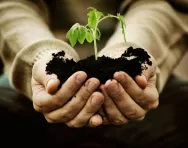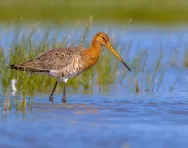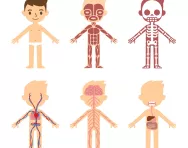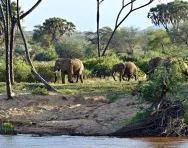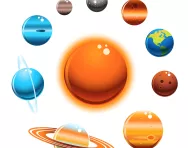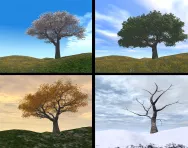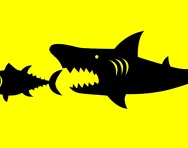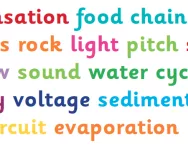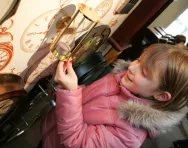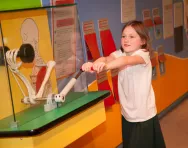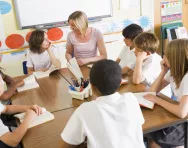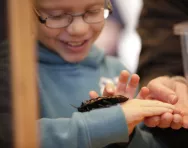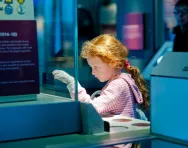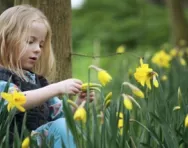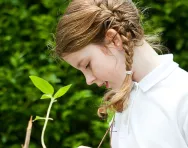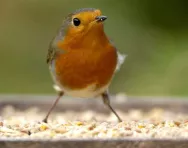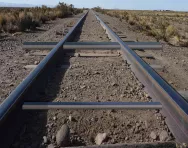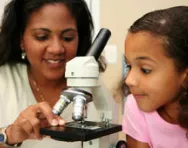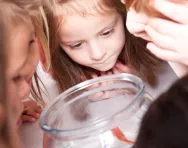6 interactive games to ignite scientific curiosity at home
Looking for ways to nurture your child's natural curiosity in science? Hands-on activities and experiments at home offer an exciting way for children to explore the wonders of the world around them.
Pawsitive changes: Animals transforming schools
Primary school headteacher, Matt Revill, explores the transformative impact of animals in educational settings, addressing key questions such as how dogs assist children in reading, the inspirational value of farm visits and the benefits children derive from therapy pets.
What your child learns in Nursery science
Children have naturally enquiring minds, and the science-based activities they do in the Early Years will help develop that sense of curiosity.
9 wildlife projects for kids
Help your child learn about and look after native species with these great outdoor activities.
Learning about LGBT issues in primary schools
How might your primary school child learn about LGBT relationships at school? We take a look at what to expect and how to support their learning.
Summer science projects for Y6 to Y7 transition
Help your child prepare for secondary-school-level work by supporting them with a summer science project. Caitlin Brown, Education Manager at the British Science Association, explains why devising, completing and presenting their own science investigation is one of the best ways for your child to prepare for Year 7 this summer – and great fun, too!
Best environmental books for kids
Empower your child to make a difference with our pick of the best children's books about the environment. From plastic pollution to climate change and the work of activists and campaigners, we highlight the best reads for young eco-warriors.
Best human body apps for kids
Help your child discover how the body works and how to keep it healthy with these anatomical apps.
Best science apps for kids
Help your child discover science through play with these brilliant games-based apps and introduce physics, chemistry and biology the digital way.
Learning about nature through books
Being in nature has many benefits for children. We asked writer and illustrator Nicola Davies for her tips on using books to kickstart an interest in the natural world.
How to raise an environmentally conscious child
Teaching our kids to take responsibility for the world around them is a duty for every parent, according to TV presenter and author Nick Baker. We spoke to him about how to do our bit – and help the next generation do theirs.
Best children's books about puberty and sex
Clear, accurate information that's age-appropriate is essential when you decide to use a book to help you discuss puberty and sex with your children. We've picked some of the best books to help you make potentially awkward conversations easier, whatever your child's age. You know your child best, so always check you're happy with the level of detail and information in a book before you share it with them.
Museums reviewed by parents: the Eden Project
Hailed by some as the 'eighth wonder of the world', this disused china clay pit is now a thriving global garden. Eden's two 'Biomes' host a plethora of plants and the world's largest indoor rainforest, set amongst more than 20 acres of landscaped gardens. There's an undercover ice rink (seasonal), adrenaline activities for thrill-seekers, and even a youth hostel/campsite if you can't bear to leave!
Museums reviewed by parents: Kew Gardens
The largest UNESCO World Heritage Site in London, Kew Gardens is a park with a difference, home to 30,000 plant species (including the world’s oldest pot plant). A natural paradise that offers the space and inspiration to play and appreciate the outdoors whatever the weather, we visited to find out what's on offer for children and families.
Museums reviewed by parents: London Wetland Centre
Get a taste of the wild without leaving the capital (or getting your feet muddy!) at WWT London Wetland Centre, a 105-acre wetland visitor centre in Barnes, southwest London. Home to wildlife species including birds, water voles, bats and amphibians, the Centre offers a great family-friendly day out.
Museums reviewed by parents: Science Museum London
Contemplate the awe-inspiring complexity of life and human scientific achievement at London's Science Museum, one of the world's leading attractions. There's something for the whole family to enjoy, from toddlers to teens, and the addition of the new Wonderlab permanent gallery for kids makes it a must-visit destination. On your marks, get set... wonder!
Museums reviewed by parents: Howletts Wild Animal Park
Watch lemurs leaping over your head, come face-to-face with a family of gorillas or even have a quick clamber through the treetops – there's a world full of animal magic to discover at Howletts Wildlife Park in Kent for parents and primary-school children alike.
What is forest school?
Taking children out of the classroom and into the great outdoors, forest school is growing in popularity – but what does it actually involve?
What are adaptation and evolution?
Children study animal and plant adaptations and evolution in Key Stage 2 science. Find out how children learn about adaptation and the theory of evolution in the primary-school classroom in our parents' guide.
What is a life cycle?
All living things have life cycles; animals produce offspring and plants produce seeds which germinate into new plants. Find out what your child learns about life cycles in the primary-school classroom, plus easy ways to support their learning at home.
Learning about plants in primary school
From the parts of a plant to the seed cycle, water transportation and photosynthesis, children learn lots about the living things around us in primary school. Find out what is taught when in the primary classroom in our parents' guide.
Learning about animals in primary school
Carnivores, herbivores and omnivores; vertebrates and invertebrates. Your child will learn about animals and their classification in primary school. We explain what they will find out about amphibians, birds, fish, mammals and reptiles.
Learning about the body in primary school
At primary school children learn about the senses, the human skeleton, teeth and their function, the digestive system, puberty, the circulatory system and more. Find out what they'll be discussing in the classroom when and how you can support their learning at home.
What is a habitat?
Children are introduced to all kinds of habitats in primary school, from arid deserts to lush rainforests and vast oceans. Find out what your child will learn in primary-school science and how you can support your child's learning at home.
Learning about space in primary school
Find out what children learn about space and our solar system at primary school with our guide for parents, and get some ideas about how to support your child's astronomical learning at home.
What are seasons?
Savour the seasons with your primary-school child by reinforcing what they learn about autumn, winter, summer and spring in KS1 with at-home activities.
What are food chains and food webs?
A food chain is a diagram that shows us how animals are linked by what they eat; in food webs we represent the links between animals who eat or are eaten by more than one kind of animal. We explain how children learn about food chains in the primary-school classroom in our guide for parents.
Primary science glossary for parents
From condensation to the water cycle, TheSchoolRun's primary-school science glossary offers a complete guide to all the concepts children are taught in EYFS, KS1 and KS2 science. Brush up on your own science knowledge, clear up homework confusion and understand exactly what your child is learning at school by reading our basic definitions (with links to more detailed explanations, teachers' tips and examples).
Museums reviewed by parents: Down House
Down House, the family home of Victorian scientist Charles Darwin, offers a unique insight into one of the world's greatest thinkers. Visit to stand in the study where Darwin wrote 'On the Origin of Species', stroll through beautiful gardens and find out more about the theory of evolution. Our family testers share their tips for a great day out in rural Kent.
Museums reviewed by parents: Thackray Medical Museum
Explore past (and future!) medical treatments and procedures, get a glimpse of life in Victorian England, get hands-on with oversized body parts and find out how humans work, all at the Thackray Medical Museum in Leeds. Our family testers share the highlights for parents and children.
Sex and relationships education: what your child learns
Sex education teaching varies hugely from school to school. We explain what goes on in KS1 and KS2 SRE lessons and outline what has changed in sex and relationship education in primary school from September 2020.
Museums reviewed by parents: Manchester Museum
Travel back in time to Ancient Egypt, see reptiles and amphibians from Costa Rica, walk beneath a giant whale skeleton, come face-to-face with a tiger and meet a life-size Tyrannosaurus rex... just a few of the highlights of a visit to Manchester Museum. Our family testers report back.
Museums reviewed by parents: Museum of Liverpool
Dress up as a dock master, play in a pint-sized port, explore first- and third-class travel in Victorian times and fall in love with the sounds of the 1960s... it's all waiting for you (and it's free!) at the Museum of Liverpool. Our parent review highlights the child-friendly activities on offer.
6 learning activities for spring weather
Welcome the new season with these spring children's activity ideas from Juno Hollyhock from Learning through Landscapes. Wellies on, gloves off, coats fastened – time to run out into the spring sunshine!
Growing to achieve at school
Gardening is part of the National Curriculum framework, so it's vital children understand plants. They'll cover the science in the classroom, but we suggest some fun ways to see the theory in action and get them growing (no garden or green fingers required!).
How to make your garden bird-friendly
Birdwatching is a brilliant learning activity to do at home that can also encourage your child to take an interest in the outdoors. We speak to the RSPB about how you can make your garden or balcony more appealing for birds, leading to better birdwatching!
Illusions and mind tricks: are your eyes fooling you?
Are you seeing what's really there, or is your mind tricking you? Professor Bruce Hood has three amazing illusions experiments to try, and explains more about how the brain works in his Royal Institution Christmas lecture.
Reception science: what your child learns
Unsure what the science curriculum covers in Reception? Read on to find out.
Simple science activities to try today
Science doesn't have to mean complicated experiments with chemicals and Bunsen burners. Children in the Early Years Foundation Stage can get involved in science with these fun, fast-results experiments. Sarah Cruickshank reports.
Primary science: what you need to know
Not sure what your child is learning in science? Swot up with our two-minute parents' guide to primary-school science.
